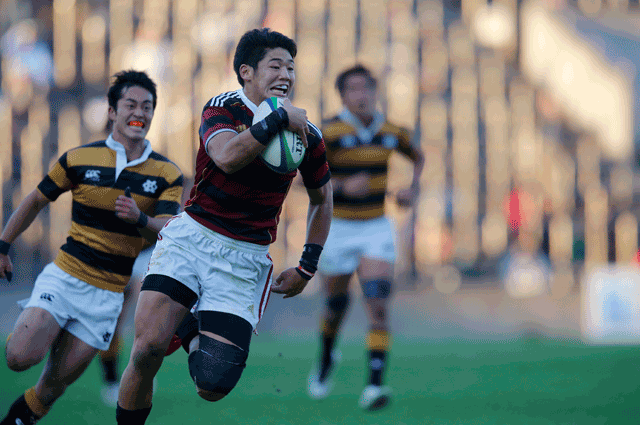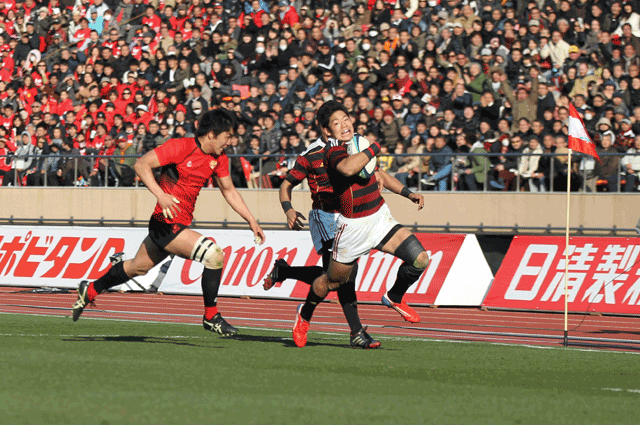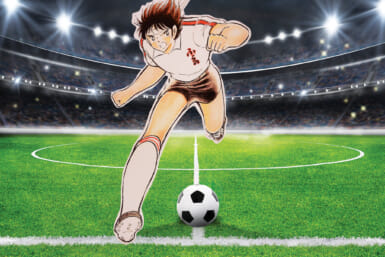The youngest member of the Japanese Olympic rugby side looks ahead to a strong showing in Rio.
By Sam De Roeck
Participating in the Olympics is a dream for many, but for Yoshikazu Fujita it is soon to be a reality. His sport is rugby sevens, which is returning to the Olympics after a ninety-two year absence.
The Waseda University flier is the youngest person to be chosen for Japan’s fifteen-a-side and sevens teams. He was told of his inclusion in a typically understated manner, through a note written by his club coach and handed to him during a meeting. He laughs when asked who he told first, “I told my family through LINE and called my mom; I spoke to her first. My dad found out through Facebook.” Both his mother and father are respected athletes in their own right. His mother played basketball in high school and his father currently runs a rugby academy, having played for a top eight team in high school. His inclusion to the Brave Blossoms is as important to his family as it is to him, explaining that “mom always wanted to raise an Olympian, regardless of the sport.”
With such high expectations it was a relief when sevens was reintroduced, but rugby was not his first sport. “I actually tried out for baseball when a friend invited me to go try out in exchange for a hamburger, but I decided to switch to rugby since my dad played rugby in high school.” Luckily for Japan he prizes winning over fast food, something that motivates him even now as he has lost four kilograms to slim down for the faster format.
It is this dedication to speed and fitness that Japanese players are often praised for, but Fujita recognizes there is more to the sport than fast feet and quick hands. Defense has been of particular interest for coaches Wataru Murata and Kensuke Iwabuchi since February 15, when the extended squad begin training together.
But their exacting preparation also comes with a sense of uncertainty. The rugby venue has been moved several times, from Estádio São Januário to the Olympic Stadium and now to the Deodoro Zone, a park that will host other events including the modern pentathlon. With a new venue and an untested ground, Fujita is minding the details. “[The ground] might be muddy and slippy compared to fields in Japan where it tends to be firm. It will be harder to get a good grip.” In the meantime he is working hard to get the best out of his body, waking up early for fitness and weight training—a tough three-hour workout—before moving on to the rest of his day.
Expectations for the Olympics will be high after the recent success in rugby’s biggest tournament. It is pressure he is acutely aware of. “We need to build up momentum toward the 2019 Rugby World Cup and 2020 Olympics,” he says.
Both are being held in Japan and with the increasing profile of the World Sevens Series it is a great time for Japanese kids to start playing the sport, which he is keen to encourage. “Rugby requires team effort and communication; it represents the true spirit of sportsmanship. There is camaraderie from both sides.”
It is this teamwork that secured Japan a memorable first win over South Africa during their World Cup campaign. It was an important victory, one that continues to motivate them, and when asked about the possibility of medals he is optimistic. “No one expected Japan to be able to beat South Africa but we did. Japan can overcome the obstacles and achieve the unthinkable.” It remains to be seen whether the sevens team can replicate the success of their peers, but with some luck Fujita can help his team to a historic medal and inspire those looking to compete for Japan in four years’ time.
Photos courtesy of Waseda University Rugby Football Club










